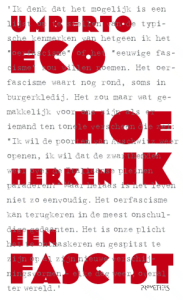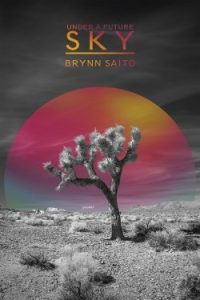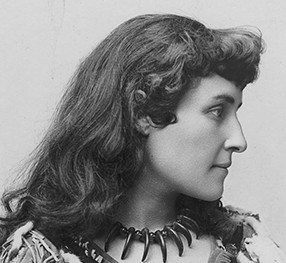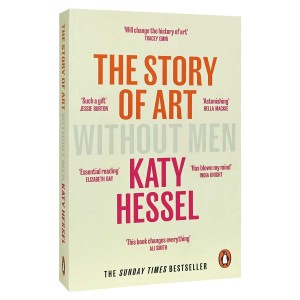Fleurs du Mal Magazine


Or see the index

Vrijheid is een open boek
In Nederland lijkt het vanzelfsprekend dat je alles kunt lezen. Maar die vrijheid is niet overal zo normaal. De Week van het Verboden Boek is geïnspireerd op de Amerikaanse Banned Books Week en wordt dit jaar voor het eerst in Nederland georganiseerd. Bibliotheken in het hele land doen mee, met lezingen, gesprekken, boekentafels en andere activiteiten.
• fleursdumal.nl magazine
More in: - Book Lovers, - Book News, Banned Books, Literary Events, PEN Actions, REPRESSION OF WRITERS, JOURNALISTS & ARTISTS
 Umberto Eco
Umberto Eco
was een Europeaan
in hart en nieren.
De oorlog in Oekraïne en het steeds verder naar een totalitaire staat afglijdende Rusland zou hij met pijn in het hart hebben aanschouwd.
Maar hij zou waarschijnlijk ook op alle mogelijke manieren van zich hebben laten horen en zich volop hebben ingezet voor vrede.
In Hoe herken ik een fascist, een selectie van drie belangrijke essays, weerklinkt Eco’s immer kritische stem.
Het is een stem waarnaar we moeten luisteren, want sluipend fascisme (‘Het eeuwige fascisme’) en zelfopgelegde censuur (‘Censuur en stilte’) vormen een steeds grotere bedreiging voor de Europese vrede.
Zijn oproep om tot nieuwe Europese afspraken te komen (‘Een nieuw verdrag van Nijmegen’) is dan ook bijna profetisch te noemen.
Umberto Eco (1932-2016) was een van de grootste en succesvolste schrijvers van Europa. Hij werd beroemd met zijn historische roman De naam van de roos, waarna romans volgden als De slinger van Foucault, Het eiland van de vorige dag, De begraafplaats van Praag en Het nulnummer. Ook geldt hij als een van de invloedrijkste essayisten van zijn tijd.
Umberto Eco
Hoe herken ik een fascist
Taal: nl
Paperback
2024
80 pagina’s
Uitgeverij Prometheus
EAN 9789044656794
12,50 EURO
•fleursdumal.nl magazine
More in: - Book News, - Bookstores, Archive E-F, Fascism, Umberto Eco

Lie-a-bed
My darling lies down
in her soft white bed,
And she laughs at me.
Her laughter has flushed
her pale cheeks with red.
Her eyes dance with glee.
My darling lies close
in her warm white bed,
And she will not rise.
I will shower kisses
down on her sleepyhead
Till she close her eyes.
Gioja’s no happier fresh
from the South.
But my kisses free
Will straiten the curves of
this teasing mouth,
If it laughs at me.
Lesbia Harford
(1891-1927)
Lie-a-bed
• fleursdumal.nl magazine
More in: Archive G-H, Archive G-H, Feminism, Harford, Lesbia, Workers of the World
Under a Future Sky is a gathering of generations, a performance with ghosts anchored in Brynn Saito’s journey with her father to the desert prison where, over 80 years ago, her grandparents met and made a life.
 Born of a personal ache, an unquenchable desire to animate the shadow archive, Saito’s journey unfolds in lyric correspondences and epistolary poems that sing with rage, confusion, and, ultimately, love. In these works, descendants of wartime incarceration exchange dreams, mothers become water goddesses, and a modern daughter haunts future ruins. To enter this book is to enter the slipstream of nonlinear time, where mystical inclinations, yellow cedars, and sisterhood make a balm for trauma’s scars. Altogether, the work enacts a dialogue between the past and the present; the radical ancestor and the future child; and the desert prison and the family garden, where Saito’s father diligently gathers stones.
Born of a personal ache, an unquenchable desire to animate the shadow archive, Saito’s journey unfolds in lyric correspondences and epistolary poems that sing with rage, confusion, and, ultimately, love. In these works, descendants of wartime incarceration exchange dreams, mothers become water goddesses, and a modern daughter haunts future ruins. To enter this book is to enter the slipstream of nonlinear time, where mystical inclinations, yellow cedars, and sisterhood make a balm for trauma’s scars. Altogether, the work enacts a dialogue between the past and the present; the radical ancestor and the future child; and the desert prison and the family garden, where Saito’s father diligently gathers stones.
Brynn Saito is the author of Power Made Us Swoon (2016) and The Palace of Contemplating Departure (2013), winner of the Benjamin Saltman Poetry Award from Red Hen Press and a finalist for the Northern California Book Award. She has received grant support from Densho, Hedgebrook, and the Santa Fe Arts Institute. Her poems have appeared in the New York Times and American Review among other journals and anthologies. She was a finalist for the Paterson Poetry Prize and the Milt Kessler Poetry Book Award. Brynn lives in Fresno, CA, where she is an Assistant Professor at California State University, Fresno and co-director of Yonsei Memory Project.
Brynn teaches in the MFA program at California State University, Fresno. She’s co-editing with Brandon Shimoda an anthology of poetry written by descendants of the Japanese American / Nikkei incarceration, forthcoming in 2025 from Haymarket Books.
Under a Future Sky
by Brynn Saito
112 pages
August 15, 2023
ISBN-13 978-1636281070
Publisher: Red Hen Press
Hardcover
€20,99
•fleursdumal.nl magazine
More in: #Editors Choice Archiv, *War Poetry Archive, - Book News, - Bookstores, Archive S-T, Archive S-T, Racism

A Cry from an Indian Wife
My Forest Brave, my Red-skin love, farewell;
We may not meet to-morrow; who can tell
What mighty ills befall our little band,
Or what you’ll suffer from the white man’s hand?
Here is your knife! I thought ’twas sheathed for aye.
No roaming bison calls for it to-day;
No hide of prairie cattle will it maim;
The plains are bare, it seeks a nobler game:
’Twill drink the life-blood of a soldier host.
Go; rise and strike, no matter what the cost.
Yet stay. Revolt not at the Union Jack,
Nor raise Thy hand against this stripling pack
Of white-faced warriors, marching West to quell
Our fallen tribe that rises to rebel.
They all are young and beautiful and good;
Curse to the war that drinks their harmless blood.
Curse to the fate that brought them from the East
To be our chiefs—to make our nation least
That breathes the air of this vast continent.
Still their new rule and council is well meant.
They but forget we Indians owned the land
From ocean unto ocean; that they stand
Upon a soil that centuries agone
Was our sole kingdom and our right alone.
They never think how they would feel to-day,
If some great nation came from far away,
Wresting their country from their hapless braves,
Giving what they gave us—but wars and graves.
Then go and strike for liberty and life,
And bring back honour to your Indian wife.
Your wife? Ah, what of that, who cares for me?
Who pities my poor love and agony?
What white-robed priest prays for your safety here,
As prayer is said for every volunteer
That swells the ranks that Canada sends out?
Who prays for vict’ry for the Indian scout?
Who prays for our poor nation lying low?
None—therefore take your tomahawk and go.
My heart may break and burn into its core,
But I am strong to bid you go to war.
Yet stay, my heart is not the only one
That grieves the loss of husband and of son;
Think of the mothers o’er the inland seas;
Think of the pale-faced maiden on her knees;
One pleads her God to guard some sweet-faced child
That marches on toward the North-West wild.
The other prays to shield her love from harm,
To strengthen his young, proud uplifted arm.
Ah, how her white face quivers thus to think,
Your tomahawk his life’s best blood will drink.
She never thinks of my wild aching breast,
Nor prays for your dark face and eagle crest
Endangered by a thousand rifle balls,
My heart the target if my warrior falls.
O! coward self I hesitate no more;
Go forth, and win the glories of the war.
Go forth, nor bend to greed of white men’s hands,
By right, by birth we Indians own these lands,
Though starved, crushed, plundered, lies our nation low . . .
Perhaps the white man’s God has willed it so.
Emily Pauline Johnson
(1861 – 1913)
A Cry from an Indian Wife
Poem
• fleursdumal.nl magazine
More in: # Classic Poetry Archive, *Archive Native American Literature, Archive I-J, Archive I-J, Emily Pauline Johnson, Racism

Bluebird
there’s a bluebird in my heart that
wants to get out
but I’m too tough for him,
I say, stay in there, I’m not going
to let anybody see
you.
there’s a bluebird in my heart that
wants to get out
but I pour whiskey on him and inhale
cigarette smoke
and the whores and the bartenders
and the grocery clerks
never know that
he’s
in there.
there’s a bluebird in my heart that
wants to get out
but I’m too tough for him,
Lesbia Harford
(1891-1927)
Bluebird
• fleursdumal.nl magazine
More in: Archive G-H, Archive G-H, Feminism, Harford, Lesbia, Workers of the World

My window pane is broken
My window pane is broken
Just a bit
Where the small curtain doesn’t
Cover it.
And in the afternoon
I like to lie
And watch the pepper tree
Against the sky.
Pink berries and blue sky
And leaves and sun
Are very fair to rest
One’s eyes upon.
And my tired feet are resting
On the bed
And there’s a pillow under
My tired head.
Parties and balls and books
I know are best
But when I’ve finished work
I like to rest.
Lesbia Harford
(1891-1927)
My window pane is broken
• fleursdumal.nl magazine
More in: Archive G-H, Archive G-H, Feminism, Harford, Lesbia, Workers of the World

Machinist’s Song
The foot of my machine
Sails up and down
Upon the blue of this
fine lady’s gown.
Sail quickly, little boat,
With gifts for me,
Night and the goldy
streets and liberty.
Lesbia Harford
(1891-1927)
Machinist’s Song
• fleursdumal.nl magazine
More in: Archive G-H, Archive G-H, Harford, Lesbia, Workers of the World

I was sad
I was sad
Having signed up in a rebel band,
Having signed up to rid the land
Of a plague it had.
For I knew
That I would suffer, I would be lost,
Be bitter and foolish and tempest tost
And a failure too.
I was sad;
Though far in the future our light would shine
For the present the dark was ours, was mine,
I couldn’t be glad.
Lesbia Harford
(1891-1927)
I was sad
• fleursdumal.nl magazine
More in: Archive G-H, Archive G-H, Feminism, Harford, Lesbia, Workers of the World
The story of art as it’s never been told before, from the Renaissance to the present day, with more than 300 works of art.
How many women artists do you know? Who makes art history? Did women even work as artists before the twentieth century? And what is the Baroque anyway?
 Guided by Katy Hessel, art historian and founder of @thegreatwomenartists, discover the glittering paintings by Sofonisba Anguissola of the Renaissance, the radical work of Harriet Powers in the nineteenth-century United States and the artist who really invented the “readymade.”
Guided by Katy Hessel, art historian and founder of @thegreatwomenartists, discover the glittering paintings by Sofonisba Anguissola of the Renaissance, the radical work of Harriet Powers in the nineteenth-century United States and the artist who really invented the “readymade.”
Explore the Dutch Golden Age, the astonishing work of postwar artists in Latin America, and the women defining art in the 2020s.
Have your sense of art history overturned and your eyes opened to many artforms often ignored or dismissed. From the Cornish coast to Manhattan, Nigeria to Japan, this is the history of art as it’s never been told before.
Katy Hessel is an art historian, broadcaster and curator dedicated to celebrating women artists from all over the world. She runs @thegreatwomenartists Instagram and The Great Women Artists Podcast, where she has interviewed the likes of Tracey Emin, Marina Abramovic and authors Ali Smith and Deborah Levy. Katy has lectured at Tate and National Gallery, presented films for the BBC, and is a Visiting Fellow at Cambridge University. She is a columnist for the Guardian, and the author of The Story of Art without Men – a Sunday Times Bestseller and winner of Waterstones Book of the Year 2022.
Katy Hessel:
The Story of Art without Men
Publisher: W. W. Norton & Company
May 2, 2023
Language: English
Hardcover: 512 pages
ISBN-10: 0393881865
ISBN-13: 978-0393881868
26,28 euro – hardcover
• fleursdumal.nl magazine
More in: #Non-fiction: Archive, - Book News, - Bookstores, Archive G-H, Art & Literature News, FDM Art Gallery, Feminism, The Ideal Woman

Song of the American Indian
Stranger, stay, nor wish to climb
The heights of yonder hills sublime;
For there strange shapes and spirits dwell,
That oft the murmuring thunders swell,
Of power from the impending steep
To hurl thee headlong to the deep;
But secure with us abide,
By the winding river’s side;
Our gladsome toil, our pleasures share,
And think not of a world of care.
The lonely cayman, where he feeds
Among the green high-bending reeds,
Shall yield thee pastime; thy keen dart
Through his bright scales shall pierce his heart.
Home returning from our toils,
Thou shalt bear the tiger’s spoils;
And we will sing our loudest strain
O’er the forest-tyrant slain!
Sometimes thou shalt pause to hear
The beauteous cardinal sing clear;
Where hoary oaks, by time decayed,
Nod in the deep wood’s pathless glade;
And the sun, with bursting ray,
Quivers on the branches gray.
By the river’s craggy banks,
O’erhung with stately cypress-ranks,
Where the bush-bee hums his song,
Thy trim canoe shall glance along.
To-night at least, in this retreat,
Stranger! rest thy wandering feet;
To-morrow, with unerring bow,
To the deep thickets fearless we will go.
William Lisle Bowles
(1762 – 1850)
Song of the American Indian
• fleursdumal.nl magazine
More in: # Classic Poetry Archive, #Archive Native American Library, Archive A-B, Archive A-B, Cowboys and Indians, Racism, Western Fiction

The Dying Slave
Faint-gazing on the burning orb of day,
When Afric’s injured son expiring lay,
His forehead cold, his labouring bosom bare,
His dewy temples, and his sable hair,
His poor companions kissed, and cried aloud,
Rejoicing, whilst his head in peace he bowed:—
Now thy long, long task is done,
Swiftly, brother, wilt thou run,
Ere to-morrow’s golden beam
Glitter on thy parent stream,
Swiftly the delights to share,
The feast of joy that waits thee there.
Swiftly, brother, wilt thou ride
O’er the long and stormy tide,
Fleeter than the hurricane,
Till thou see’st those scenes again,
Where thy father’s hut was reared,
Where thy mother’s voice was heard;
Where thy infant brothers played
Beneath the fragrant citron shade;
Where through green savannahs wide
Cooling rivers silent glide,
Or the shrill cicalas sing
Ceaseless to their murmuring;
Where the dance, the festive song,
Of many a friend divided long,
Doomed through stranger lands to roam,
Shall bid thy spirit welcome home!
Fearless o’er the foaming tide
Again thy light canoe shall ride;
Fearless on the embattled plain
Thou shalt lift thy lance again;
Or, starting at the call of morn,
Wake the wild woods with thy horn;
Or, rushing down the mountain-slope,
O’ertake the nimble antelope;
Or lead the dance, ‘mid blissful bands,
On cool Andracte’s yellow sands;
Or, in the embowering orange-grove,
Tell to thy long-forsaken love
The wounds, the agony severe,
Thy patient spirit suffered here!
Fear not now the tyrant’s power,
Past is his insulting hour;
Mark no more the sullen trait
On slavery’s brow of scorn and hate;
Hear no more the long sigh borne
Murmuring on the gales of morn!
Go in peace; yet we remain
Far distant toiling on in pain;
Ere the great Sun fire the skies
To our work of woe we rise;
And see each night, without a friend,
The world’s great comforter descend!
Tell our brethren, where ye meet,
Thus we toil with weary feet;
Yet tell them that Love’s generous flame,
In joy, in wretchedness the same,
In distant worlds was ne’er forgot;
And tell them that we murmur not;
Tell them, though the pang will start,
And drain the life-blood from the heart,—
Tell them, generous shame forbids
The tear to stain our burning lids!
Tell them, in weariness and want,
For our native hills we pant,
Where soon, from shame and sorrow free,
We hope in death to follow thee!
William Lisle Bowles
(1762 – 1850)
The Dying Slave
• fleursdumal.nl magazine
More in: # Classic Poetry Archive, *Archive African American Literature, Archive A-B, Archive A-B, Black Lives Matter, Racism
Thank you for reading Fleurs du Mal - magazine for art & literature